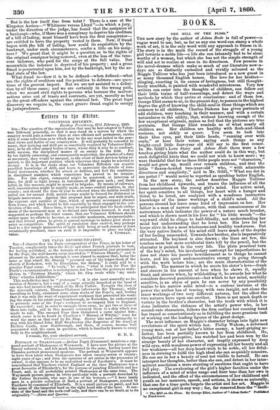THE PATA.L EXCOMMUNICATION.
But—I observe that the Paris correspondent of the Times, in his letter of Tuesday, complacently takes the Sack and other French journals to task, for having published, as the formula of excommunication just pronounced by the Pope, the well-known curse inserted in " Tristram Shandy," and is pleasant on the subject, as though it were absurd to suppose that, being the same as that which Mr. Shandy "procured out of the ledger-book of the church of Rochester, writ by Ernulphus, the Bishop," it could still be a genuine Papal curse. "In truth," he says, "what it took for Pius the Ninth's excommunication is nothing more nor less than the grotesque male- diction in Tristram Shandy,' which Dr. Slop reads while my uncle Toby' whistles Lillibullero." This malediction may be " grotesque " : it is also most assuredly no in- vention of Sterne's, but a copy of a curse actually launched at the head of one who had incurred the wrath of the Holy Father. Towards the close of the sixteenth century, Thomas Chaloner (afterwards Sir Thomas), while travelling in Italy, examined some alum works of the Pope's, and, finding that it was only the want of experienced workmen that prevented his work- ing the alum on his estate near Guisborough, in Yorkshire, he endeavoured to persuade some of the Pope's workmen to accompany him to England. He succeeded ; and, in order to smuggle them away, he put two or three of them into casks' and in this manner conveyed them to a ship which was ready to sail. The enraged Pope then thundered a curse against him ; which curse is to be found in Charlton's "History of Whitby," word for word the same as that read by Dr. Slop. Sterne also used continually to stay with his friend John Hall Stephenson (the Eugenius of his story) at Skelton Castle, near Guisborough, and there' of course, became well acquainted with the curse in question, which isfamiliarly known to every body in the neighbourhood.
I remain, Sir, your obedient servant, G. H. S.


























 Previous page
Previous page